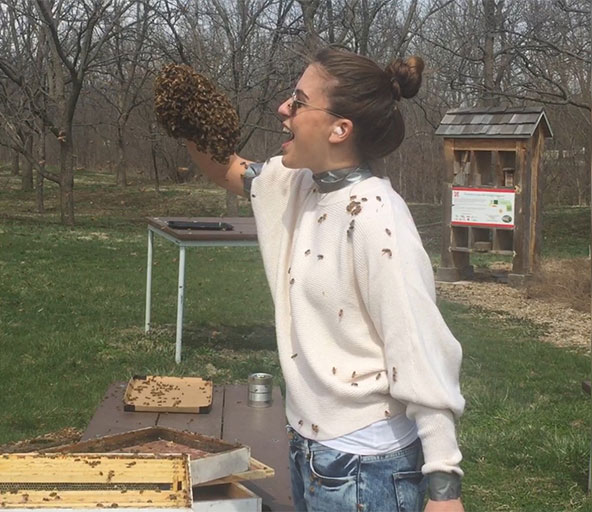This is a continuation of our "IANR is Global" series, which highlights the many ways internationalization is woven through the Institute of Agriculture and Natural Resources: through research collaboration, government and private industry partnerships, extension work, student educational experiences and beyond.
One of the most important things a mentor can do is to see potential in someone when they perhaps do not see it themselves. In the case of Tuğçe Karaçoban, a graduate student with a background in veterinary medicine who will receive her master's degree in entomology at this weekend’s commencement ceremony, that made all the difference.
Karaçoban earned her bachelor’s degree in veterinary medicine at Kirikkale University in Turkey, then worked for a year at an animal hospital in Ankara. In the meantime, she learned of and successfully applied for a scholarship from her government to, unexpectedly, study the viral diseases of bees. “In Turkey there is big importance on apiculture, which is based on a 9,000 year history,” said Karaçoban. “Due to Turkey’s climate and rich botanical diversity, it has one of the highest potentials in the world for apiculture.”
After securing the scholarship and searching through universities all over the U.S., she found and got in contact with Nebraska’s Judy Wu-Smart, extension and research entomologist. Wu-Smart agreed to take her on as a graduate student and Karaçoban began her M.S. program in 2016, working on viral diseases of honey bees and wild bees with a focus on the profile of viral prevalence among social bees in different landscapes in Nebraska. As a student, she took advantage of the opportunities to grow her knowledge of bees and progress on her research with the UNL Bee Lab, all while helping to engage the public in conversations about the important pollinators. She says she enjoyed the dual opportunity to attend workshops to learn about beekeeping as well as being able to share her knowledge with others at outreach and extension events.
In addition to the change in academic area, Karaçoban found that it wasn't just a different country she needed to adjust to, but also the size of her new home city and pace of life.
“When I came to Lincoln in 2016, I was surprised it was a very quiet city and even more on East Campus. I was bored at first because I was coming from a very big city,” she said. “But then after getting used to it, I became happier ... there were so many friendly relationships between faculty and students, and I loved to see people every morning with big smiles on their faces. I will definitely miss Nebraskan people.”
With degree in hand and her Nebraska experience under her belt, Karaçoban looks forward to her future career helping to further understand and improve bee health back in her home country. She will return there to join the Apiculture Research Institute of the Republic of Turkey, part of the Ministry of Food, Agriculture, and Livestock in Ordu, where she will work on bee diseases as a research scientist.
“I am very honored and grateful to have had Dr. Wu-Smart as my adviser and academic mentor. I cannot find enough words to thank her for all her support, advice, mentorship, friendship, and of course, patience,” said Karaçoban. “Judy believed in my potential when I did not even know I had any. And for that I will always thank her.”
By Brianne Wolf, Institute of Agriculture and Natural Resources Global Engagement
Do you have an international element to your work, studies, or background that you'd like to see highlighted in our "IANR is Global" Series? Contact Brianne Wolf at bwolf4@unl.edu.
